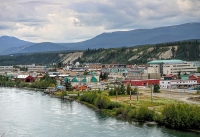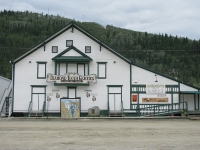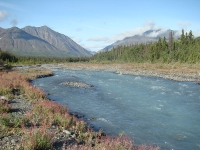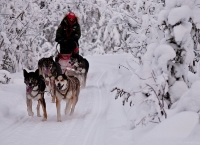Overview of Yukon Territory

Photo credit: Judith Duk
The Yukon's tourism is focused around outdoor activities such as fishing, canoeing, kayaking and hiking in the summer, and skiing, snowboarding, ice climbing, snowmobiling and dog sledding in the winter.
The Yukon also has its own natural magical light show in winter: undulating ribbons of pale-green, pink and blue lights shimmer in the night sky as the Aurora Borealis phenomenon delights watchers below. The province also boasts Canada's highest mountain, the majestic Mount Logan peak in Kluane Park, which rises up from a sea of ice.
Although 80 percent of the Yukon is wilderness, people live here too. Native Yukoners are spirited and uniquely connected to their land, having plenty of tales and traditions to share with travellers. Many legends survive from the days of the Klondike Gold Rush in 1897, when 30,000 aspirants arrived in Dawson City in hope of making their fortunes. The First Nations culture is also well preserved, with museums, historic sites and interpretive centres throughout the province providing fascinating insights.
Key Facts
- Language:
- The official languages are English and French (spoken predominantly in Quebec).
- Passport/Visa:
All visitors must hold a valid passport, and it's recommended that passports always be valid for six months after the intended period of travel. Visitors are required to hold onward or return tickets, all documents needed for the next destination and sufficient funds to cover the period of intended stay.
Travellers from most visa-exempt countries arriving in Canada by air need to fill in an Electronic Travel Authorisation (eTA) form online prior to visiting Canada. This requirement is applicable to all but U.S citizens and travellers with a valid Canadian visa. Canadian citizens, including dual citizens, and Canadian permanent residents cannot apply for an eTA. As part of the Western Hemisphere Travel Initiative (WHTI), all travellers travelling between the United States and Canada, Mexico, Bermuda, and the Caribbean region are required to present a passport or other valid travel documents to enter or re-enter the United States. If departing from the USA a valid passport will be required by immigration authorities.
- Currency:
The currency used is the Canadian dollar (CAD). Banks and bureaux de change will change cash, as will some hotels. Major credit cards are widely accepted and ATMs are widespread. US dollars are widely accepted.
- Electricity:
- Electrical current is 120 volts, 60Hz. American-style flat two-pin plugs and a plug with a third round grounding pin are standard.
Travel Advisories
Travel to Yukon Territory
Climate
The Yukon Territory climate is primarily subarctic, and most of the province is at a high elevation with semiarid conditions, creating warm summers with temperatures averaging 77°F (25°C) and up. Summer days are long, usually with 24-hour daylight in June and July due to the extreme northerly location of the province. Winters, the peak months of which are December to February, tend to be bitterly cold, with little sun resulting in very short days. Temperatures in the southern regions can average between 39°F (4°C) and -58°F (-50°C), while further north temperatures drop even lower.
Health Notes when travelling to Canada
Travellers should be up to date with your COVID-19 vaccines before traveling to Canada, and should consider taking routine vaccines as a standard precaution. Medical care is excellent but expensive, so medical insurance is advised.
Safety Notes when travelling to Canada
While most visits to Canada are trouble-free, the country does share the common international risk of terrorism. The crime rate is low but travellers are advised to take sensible precautions to safeguard their belongings, as they would anywhere. Parts of Canada are prone to tornadoes between May and September.
Customs in Canada
Rowdiness and loud speech are inappropriate except under special circumstances or in places such as bars, as Canadians tend to be soft spoken, patient and almost apologetic in their public behaviour. They are generally tolerant of the complex network of cultural differences in public behaviour, particularly in cities where such diversity is more common place. Recreational cannabis is legally available throughout Canada, though local laws can vary depending on the province or territory travellers are visiting.
Duty Free in Canada
Travellers to Canada are allowed to enter the country with the following items without incurring custom duties: gifts to the value of C$60 per recipient (excluding advertising material, tobacco and alcoholic beverages); 200 cigarettes, 50 cigars or cigarillos and 200g of tobacco or 200 tobacco sticks; 1.14 litres of liquor or wine or 24 x 355ml bottles or cans of beer or ale. There are strict regulations governing the import of the following: explosives, endangered animal and plant species, items of heritage, fresh foodstuffs and weapons.
Doing Business in Canada
Vancouver, Toronto, Calgary, and Montreal are the main business centres, and English is the language of business except in French-speaking Quebec, where all written material and business cards should be in French. Business cards are not traditionally exchanged during an initial meeting, but at some appropriate time thereafter; it is best to wait for the host to offer theirs first.
A firm handshake is used by way of greeting and punctuality should be taken seriously for meetings. Canadians dress conservatively and smartly for business and suits are the norm. Gifts can be given in conclusion to celebrate a deal, but should be understated; taking someone out for a meal is a popular way to conclude business dealings.
Canadians are reserved and frown on emotional outbursts. Business is based on facts and figures rather than relationships, so it is best to be as prepared as possible for meetings. Hours of business are usually 9am to 5pm, Monday to Friday.
Communication in Canada
The international access code for Canada is +1. The outgoing code is 011 followed by the relevant country code. The outgoing code is not necessary for calls to the US and the Caribbean. Hotels, cafes and restaurants offering free WiFi are widely available. As international roaming costs can be high, purchasing a local prepaid SIM card can be a cheaper option.
Tipping in Canada
A tip of around 15 percent is standard in restaurants, and hairdressers and taxi drivers are usually tipped at the same rate. Bellhops, doormen, porters, and similar service providers at hotels, airports, and stations are generally paid at the customer's discretion.
Passport/Visa Note
All visitors must hold a valid passport, and it's recommended that passports always be valid for six months after the intended period of travel. Visitors are required to hold onward or return tickets, all documents needed for the next destination and sufficient funds to cover the period of intended stay.
Travellers from most visa-exempt countries arriving in Canada by air need to fill in an Electronic Travel Authorisation (eTA) form online prior to visiting Canada. This requirement is applicable to all but U.S citizens and travellers with a valid Canadian visa. Canadian citizens, including dual citizens, and Canadian permanent residents cannot apply for an eTA. As part of the Western Hemisphere Travel Initiative (WHTI), all travellers travelling between the United States and Canada, Mexico, Bermuda, and the Caribbean region are required to present a passport or other valid travel documents to enter or re-enter the United States. If departing from the USA a valid passport will be required by immigration authorities.
Entry Requirements
- Entry requirements for Americans:
US travellers should have a valid passport if departing from the USA. Other proof of citizenship is accepted in the form of a birth certificate, a US certificate of citizenship, a US certificate of naturalisation, or a NEXUS card. A visa is not required for a stay of up to six months.
- Entry requirements for UK nationals:
UK nationals must have a passport valid for the period of intended stay. A visa is not required for a stay of up to six months, though UK travellers must have Electronic Travel Authorisation (eTA).
- Entry requirements for Australians:
Australians must hold passports valid for period of intended stay. Nationals of Australia with an Electronic Travel Authorisation (eTA) are visa exempt for a maximum stay of 6 months.
- Entry requirements for Irish nationals:
Irish nationals must hold a passport valid for the period of intended stay. A visa is not required for stays of up to six months. However, the individual must have an Electronic Travel Authorisation (eTA).
- Entry requirements for New Zealanders:
New Zealanders require a passport valid for the period of the intended stay. No visa is required for stays of up to 6 months. However, the traveller requires an Electronic Travel Authorisation (eTA).
- Entry requirements for South Africans:
South African nationals must be in possession of a passport valid for the period of intended stay. A visa is required. South African temporary passports are not recognised. Passports, identity or travel documents of Bophuthatswana, Ciskei, Transkei and Venda are not accepted.
Currency
The currency used is the Canadian dollar (CAD). Banks and bureaux de change will change cash, as will some hotels. Major credit cards are widely accepted and ATMs are widespread. US dollars are widely accepted.
| Exchange rate for 1 CAD - Canadian Dollar | |||||
|---|---|---|---|---|---|
|
0.00 BMD Bermudan Dollar |
0.68 EUR Euro |
0.73 USD U.S. Dollar |
0.58 GBP U.K. Pound Sterling |
111.95 JPY Japanese Yen |
0.66 CHF Swiss Franc |
|
1.11 AUD Australian Dollar |
28.83 UAH Ukrainian Hryvnia |
324.82 KZT Kazakhstani Tenge |
68,104.49 LBP Lebanese Pound |
3.55 LYD Libyan Dinar |
5.02 BOB Bolivian Boliviano |
|
0.00 NPR Nepalese Rupee |
0.00 OMR Omani Rial |
0.00 QAR Qatari Rial |
0.99 SGD Singapore Dollar |
7.92 SEK Swedish Krona |
0.00 TTD Trinidad Tobago Dollar |
|
0.00 VEF Venezuelan Bolivar |
42.52 DOP Dominican Peso |
0.00 HRK Croatian Kuna |
12.41 MXN Mexican Peso |
446.74 XOF West African CFA Franc |
0.00 PGK Papua New Guinean kina |
|
0.00 BSD Bahamian Dollar |
0.00 FJD Fiji Dollar |
0.00 HNL Honduran Lempira |
97.95 DZD Algerian Dinar |
0.00 MMK Myanma Kyat |
0.00 BWP Botswana Pula |
|
2.72 PEN Peruvian Nuevo Sol |
686.67 CLP Chilean Peso |
283.06 AMD Armenia Dram |
17.04 CZK Czech Koruna |
12.90 MDL Moldova Lei |
102.36 ISK Icelandic Krona |
|
9,206.75 UZS Uzbekistan Sum |
2.72 ILS Israeli New Sheqel |
0.52 JOD Jordanian Dinar |
0.00 KWD Kuwaiti Dinar |
27.92 UYU Uruguayan Peso |
0.00 MUR Mauritian Rupee |
|
0.00 NIO Nicaraguan Córdoba |
7.96 NOK Norwegian Krone |
2.95 PLN Polish Zloty |
2.74 SAR Saudi Riyal |
0.00 LKR Sri Lanka Rupee |
26.92 THB Thai Baht |
|
2.68 AED U.A.E Dirham |
3.73 BRL Brazilian Real |
3.39 RON Romanian New Leu |
5.72 HKD Hong Kong Dollar |
446.74 XAF Central African CFA Franc |
18,589.76 VND Vietnamese Dong |
|
642.71 ARS Argentine Peso |
0.00 XCD East Caribbean Dollar |
0.00 GTQ Guatemalan Quetzal |
7.36 MAD Moroccan Dirham |
0.00 BHD Bahrain Dinar |
0.73 PAB Panamanian Balboa |
|
1.24 AZN Azerbaijan Manat |
2,868.33 COP Colombian Peso |
64.70 KGS Kyrgyzstan Som |
264.88 HUF Hungarian Forint |
7.97 TJS Tajikistan Ruble |
11,761.39 IDR Indonesian Rupiah |
|
35.09 EGP Egyptian Pound |
994.29 KRW South Korean Won |
5,456.06 PYG Paraguayan Guaraní |
3.47 MYR Malaysian Ringgit |
371.94 CRC Costa Rican Colón |
1.22 NZD New Zealand Dollar |
|
203.32 PKR Pakistani Rupee |
66.87 RUB Russian Rouble |
13.54 ZAR South African Rand |
2.29 TND Tunisian Dinar |
0.00 BBD Barbadian Dollar |
1.33 BGN Bulgarian Lev |
|
23.66 TRY Turkish Lira |
41.92 PHP Philippine Peso |
23.64 TWD New Taiwan Dollar |
852.33 NGN Nigerian Naira |
0.00 XPF CFP Franc |
0.00 GHS Ghanaian Cedi |
|
0.00 JMD Jamaican Dollar |
0.00 ANG Neth. Antillean Guilder |
0.00 BND Brunei Dollar |
79.69 RSD Serbian Dinar |
5.30 CNY Chinese Yuan |
5.08 DKK Danish Krone |
|
2.55 TMT New Turkmenistan Manat |
61.04 INR Indian Rupee |
||||
U.S. Dollar to Canadian Dollar
1 USD = 1.37 CAD
Euro to Canadian Dollar
1 EUR = 1.47 CAD
U.K. Pound Sterling to Canadian Dollar
1 GBP = 1.72 CAD
Australian Dollar to Canadian Dollar
1 AUD = 0.90 CAD
New Zealand Dollar to Canadian Dollar
1 NZD = 0.82 CAD
South African Rand to Canadian Dollar
1 ZAR = 0.07 CAD
Airports in Yukon Territory
Whitehorse

Photo credit: Gareth Sloan
Today, its central position on the historic Alaskan Highway is convenient for visitors exploring the region, sitting halfway between Dawson Creek, British Columbia and Fairbanks, Alaska. The Yukon Visitor Reception Centre is a good place to start exploring the province, offering handy tips, maps and suggestions for tours and activities.
The main attraction in Whitehorse is the restored SS Klondike, a river steamer that ferried passengers north to Dawson City. Moored on the Yukon River, tours of the steamer inform visitors about the history of the gold rush, the river and the region's First Nations people.
The MacBride Museum houses exhibits on a range of local topics, including a Klondike gold exhibition in a complex of log buildings. Other attractions include the four-storey log skyscraper, one of the most photographed buildings in Whitehorse; and Miles Canyon, from where the city's name originated. Its rapids were likened to the manes of charging white horses.
Climate in Whitehorse
Located in the Yukon Territory, Whitehorse has a dry subarctic climate with extreme variations between seasonal temperatures. Average daytime highs in summer (June to August) are 70°F (21°C) and the average lows of winter (December to February) are -7.6° F (-22° C). Average annual snowfall is 4.76ft (145 cm) while the annual rainfall is 6.4 inches (163 mm), making Whitehorse Canada's driest city.
Sightseeing in Whitehorse
The main appeal of the Yukon, of course, is its unspoilt wilderness, with Whitehorse being a great base from which to take excursions into the great outdoors. The Yukon Wildlife Preserve is the ideal spot to encounter the local wildlife as it is home to the region's 10 major animal species: lynx, woodland caribou, elk, moose, wood bison, mountain goats, muskoxen, mule deer and two species of Dall's sheep.
Because the Yukon is a place where dogs are so integral to local culture, a visit to Muktuk Adventures is a must. Another option for those interested in dog-sledding and other outdoor ranching activities are the tours offered by Sky High Wilderness Ranch. Plenty of scenic hiking is possible in and around Whitehorse, with Miles Canyon a particular favourite, and the stretching expanses of Kluane National Park are great for nature lovers.
Cultural and historical sightseeing attractions in Whitehorse include the MacBride Museum of Yukon History, the SS Klondike sternwheeler ship, the Yukon Beringia Interpretive Centre and a number of fun gold-rush sites.
Whitehorse Attractions
Klondike

Photo credit: Arthur Chapman
Website: dawsoncity.ca
Kluane National Park

Photo credit: Wikibunt
Website: https://www.pc.gc.ca/en/pn-np/yt/kluane
Muktuk Adventures

Photo credit: Jeff Nelson
Address: Kilometre marker 1443, Alaska Highway, Whitehorse
Website: http://www.muktuk.com
Yukon Territory Attractions
Overview
Klondike

Photo credit: Arthur Chapman
Website: dawsoncity.ca
Kluane National Park

Photo credit: Wikibunt
Website: https://www.pc.gc.ca/en/pn-np/yt/kluane
Muktuk Adventures

Photo credit: Jeff Nelson
Address: Kilometre marker 1443, Alaska Highway, Whitehorse
Website: http://www.muktuk.com
News about Yukon Territory
- How To Plan A Trip To Canada's Yukon Territory Before It Gets Too Cold
-
Canada's Yukon Territory is an adventure just waiting to happen, and before temps drop below freezing, there's plenty that potential visitors can do
